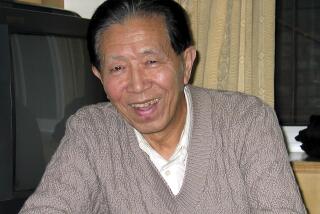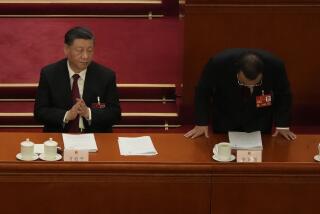Medical Team Reportedly Is Rushed to Deng : Condition of China’s 84-Year-Old Leader Said to Have Worsened
- Share via
BEIJING — A special medical team has been rushed to the seaside resort town of Beidaihe to provide care for China’s ailing senior leader, Deng Xiaoping, a Japanese news agency reported Friday.
Deng, 84, is widely rumored to have a serious prostate disorder, possibly cancer. His health worsened about four days ago, and doctors were trying to decide whether to have him flown back to Beijing, where better medical facilities are available, according to the news agency Jiji Press.
China’s Foreign Ministry this morning issued a terse statement denying the Japanese report.
“The report is sheer fabrication with ulterior motives,” the statement said in full.
Top Leaders Summoned
Jiang Zemin, 62, the Communist Party general secretary, and President Yang Shangkun, 81, the two men best positioned to succeed Deng, were among a number of top party and government leaders who went to Beidaihe this week, apparently in response to Deng’s worsening condition, the Japanese news agency said.
Like many other senior leaders, Deng spends part of every summer at Beidaihe. Usually, informal but important high-level political meetings take place there, but these have been canceled this summer, officially as a cost-cutting measure.
Jiji quoted an unidentified Chinese source as saying that Deng has cancer of the prostate and another Chinese source as saying that he has cancer of the throat. It was not clear whether these reports were in conflict or whether they might indicate that cancer had spread from one site to the other.
Deng has made no public appearance since June 9, when he was shown on television giving a speech endorsing the June 3-4 crackdown on pro-democracy demonstrations.
Any worsening in Deng’s condition would intensify an already severe power struggle among the top leadership, as various individuals and factions jockey for position.
Jiang, the party general secretary, appears to support a continuation in Deng’s overall policy of the past decade, which combines strict political dictatorship with market-oriented reforms and an opening to the world.
But Jiang became general secretary only in late June, in the aftermath of the bloody crackdown that ended seven weeks of student-led protests. He is largely dependent on Deng’s patronage, and if Deng were to die any time soon, Jiang would almost certainly be buffeted by conflicting forces.
Deng’s policies have helped hold the party together because his political ideas generally satisfy orthodox Marxist hard-liners while his economic program meets the demands of reformers.
But some hard-liners who agree with Deng on the issue of political dictatorship would prefer to stop or at least roll back the market reforms. The party’s most enthusiastic reformers believe that economic reform must be matched by greater political openness.
Thus, the stage is set for an outbreak of intense personal and ideological rivalry among top leaders once Deng can no longer control events.
President Yang, who played a key role in the crackdown and who has great influence in the army, now appears to be the second most powerful person in China, after Deng. Yang has generally supported Deng’s reform program but may be less committed than Deng to moving forward with such difficult changes as price reform.
Former General Secretary Zhao Ziyang, 69, who has been the leader of the reformist faction within the party, is believed to be still under house arrest at the Zhongnanhai compound in central Beijing, where many of China’s top leaders live and work.
More to Read
Sign up for Essential California
The most important California stories and recommendations in your inbox every morning.
You may occasionally receive promotional content from the Los Angeles Times.










